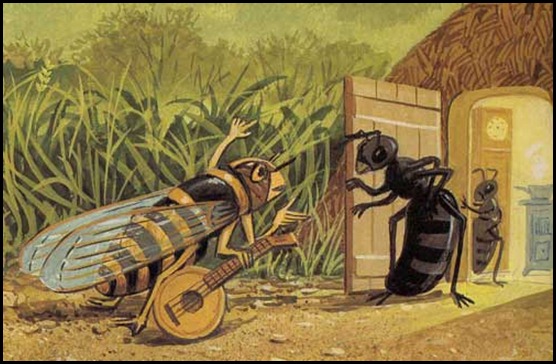La Cicala: favole e leggende Posted by Serena on Jul 2, 2011 in Culture
There are many popular sayings and proverbs about la cicala, and not surprisingly his frinio (strident song) plays an important part in most of them.
Probably the most famous cicada favola (fable) is that written by Esopo (Aesop): La Cicala e la Formica. Here is an adaptation of the tale by the French poet and writer Jean de La Fontaine (1621 – 1695):
La Cicala e la Formica (The Cicada and the Ant) N.B. In English this fable is often incorrectly known as ‘The Ant and the Grasshopper’.
Durante l’estate la formica lavorava duramente, mettendosi da parte le provviste per l’inverno. Invece la cicala non faceva altro che cantare tutto il giorno. Poi arrivò l’inverno e la formica ebbe di che nutrirsi, dato che durante l’estate aveva accumulato molto cibo. La cicala cominciò a sentire i morsi della fame, perciò andò dalla formica a chiederle se poteva darle qualcosa da mangiare. La formica le disse: “Io ho lavorato duramente per ottenere questo e tu che cosa hai fatto durante l’estate?” “Ho cantato” rispose la cicala. La formica esclamò: “Allora adesso balla!”
Morale: chi nulla mai fa, nulla mai ottiene.
During the summer the ant worked hard, putting aside provisions for the winter. The cicada, on the other hand, did nothing but sing all day long. Then the winter arrived, and the ant, who had accumulated lots of food during the summer, had plenty to eat. The cicada began to feel pangs of hunger, so she went to the ant to ask it if she could give her something to eat. The ant said to her: “I’ve worked hard to obtain this, and you, what did you do during the summer?” “I sang” exclaimed the cicada. “Well then, now you can dance!”
Moral: he who does nothing, obtains nothing.
It is said that at one time in the countryside, the cicaleccio (chattering) of the cicala which accompanied the reapers as they worked in the fields caused them to reflect upon the injustice of the fact that they would soon have to give a large portion of the fruits of their hard labor to il padrone (the landowner). In Romagna, the peasants would often chant “Dice la cicala al cicalino: il grano al padrone e la paglia al contadino” (“Said the cicada to the little grasshopper: the grain to the landowner and the straw to the peasant”) whilst they were stacking the sheaves of corn.
The cicada, as you will see from the photo in my previous blog, has rather bulbous eyes. The following legend explains why:
“Una volta, tanti anni fa, un cuculo lavorava nella costruzione di una casa, trascinandosi su e giù per le scale portando sulle spalle la calce, ed aiutandosi, per la gran fatica, ripetendo so pu’, so pu’, so pu’ (su pure, su pure, su pure). Un’insolente cicala, posata poco lontano, lo canzonava dicendogli: dai, dai, dai. Il cuculo, persa la pazienza, la rincorse, raggiungendola proprio in una bottega di un fabbro, dove, preso un martello, la schiacciò su un’incudine, facendole schizzare gli occhi fuori dalla testa”.
Once, many years ago, a cuckoo was working on the construction of a house. Dragging himself up and down the steps carrying lime on his shoulders, he helped himself in his great fatigue by repeating ‘come on, up, come on, up, come on,up’. An insolent cicada, resting not far away teased him saying: ‘go on, go on, go on,’. The cuckoo losing his patience, ran after her, catching her in a blacksmith’s workshop, where, taking hold of a hammer, he squashed her on an anvil, making her eyes pop out of her head”.

Build vocabulary, practice pronunciation, and more with Transparent Language Online. Available anytime, anywhere, on any device.





Comments:
Lee:
Thanks to our liberal, socialist president, the ant now has to give half of the food that he worked for to the cicada, the other half to the queen (of the ant colony) so it can be spread to the rest of the ants, who trade it for sugar. 2 years from now, the cicada and half the ants are dead from sugar over doses, the other half is on welfare and the original hard working ant has to work till he’s 95 and dies from a heart attack.
Just a social commentary. Great post Serena!
Serena:
@Lee Lee, I think that with your highly developed cynical sense of humour you’re almost ready to survive in Italy 😉
Thanks for your comment, Serena
Anthony Miksak:
“losing his patience” not “loosing” it… OK?
Serena:
@Anthony Miksak Grazie Anthony, alle volte non è mica facile scrivere in due lingue contemporaneamente. Si fanno degli sbagli. Adesso l’ho corretto.
Saluti da Serena